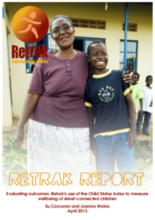Retrak is an organization that works with street children in Africa. This report offers an evaluation of the impact of Retrak's programs in Ethiopia and Uganda in its pilot period (2011 and 2012) and the progress of the children involved in the programs, using the Child Status Index (CSI) as a measurement of child wellbeing and a tool for tracking children’s progress as they transition from the street to family homes. The CSI was developed by Measure Evaluation and is comprised of a system of indicators that assess the multidimensional wellbeing of the individual child across six areas of measurement (food and nutrition, shelter and care, protection, health, psychosocial, and education and skills). The report discusses the methodology used, the findings of the CSI assessments in both Ethiopia and Uganda, and concludes with recommendations for reintegration programming.
The CSI assessments were conducted with cohorts of street children who access Retrak’s drop-in centers; at the point of reintegration with their families; and again during intervals of follow-up with the children and their families. The findings of the study indicate that children who have worked with Retrak do see an improvement in their wellbeing across all six areas. However, education remained an area in which improvement was limited, as scores on performance and access to education were slow to improve at the placement and follow-up levels. In Ethiopia, the improvement of social and emotional wellbeing of children was also limited at the placement and follow-up stages. In Uganda, food security, shelter, and legal protection for children remained a concern throughout the stages of intervention in the Retrak program. Furthermore, the study determined that children in Ethiopia who are above the age of 14 tend to experience worse outcomes than those under 14 and the longer children spend on the street, the more deprivations they are likely to experience. Conversely, in Uganda, children on the streets who are 14 and over tend to experience fewer deprivations than do those 13 and younger. Educational attainment also had an impact on number of deprivations, according to the study. In Ethiopia, the more time children had spent in school, the fewer deprivations they experienced.
The report concludes with recommendations for national and international policy as well as reintegration programming. Among the recommendations made, the study suggests that more emphasis be placed on reintegration rather than institutionalization for street children, as findings indicate that reintegration is a successful intervention for the promotion of child wellbeing. Furthermore, the report urges Retrak and other organizations to develop strong outreach methods, especially to target younger children and those who have just migrated to the streets. The recommendations also emphasize the importance of education, strengthening programs to help children reintegrate into academic settings as well as improving education policies to better meet the needs of vulnerable children. Other areas of focus for recommendations include: psychosocial wellbeing (offering counseling and support to children) and conducting thorough and accurate monitoring and impact assessment. The authors also encourage other practitioners working with street connected children to use the CSI both for case management purposes and for monitoring changes in children’s wellbeing on the streets and during the reintegration process.
©Retrak

